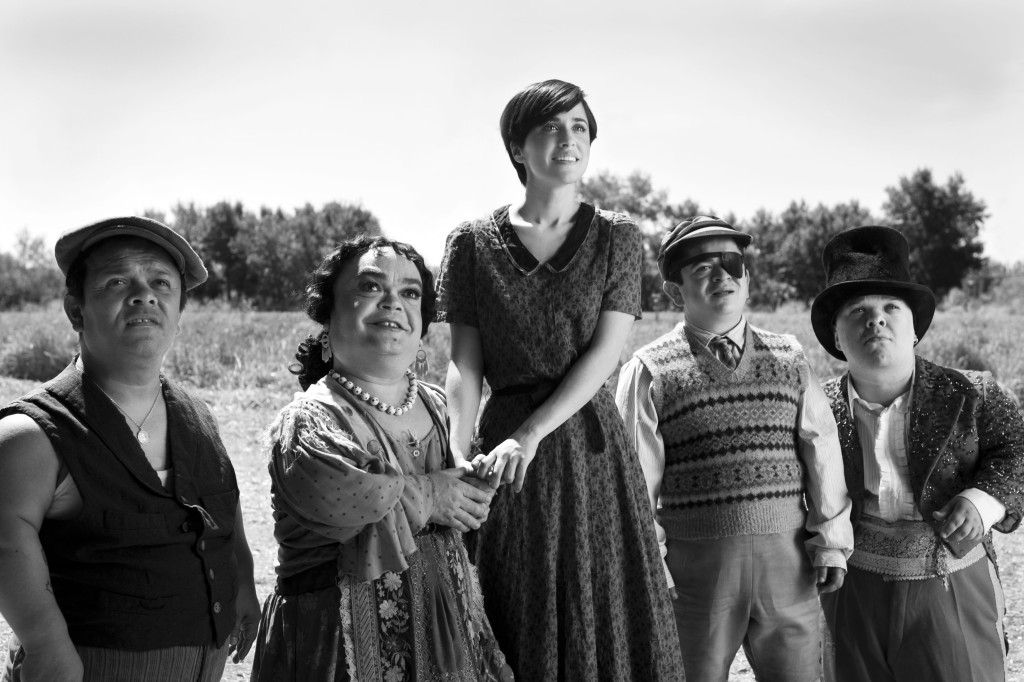‘Blancanieves’ puts grim back in Grimm
By Julia Siedlanowska, Staff Writer
4/5
We all know how most women are portrayed in classic fairy tales: said female is in distress, the Prince rides in on his white steed to save her, and they live happily ever after. The End.
From a feminist perspective this is tiresome, especially when these fairy tales are removed of any of their original grit and gore by the likes of Disney, then spat back out in Technicolor to be consumed by the next 10 generations. While progress is apparently being made with films like Brave and Frozen (which I cannot personally vouch for), the original fairy tales have been dulled down to fit into a less terrifying category. As many of us know, the traditional folk tales collected by the Brothers Grimm were full of atrocities that would make even a veteran horror fan cringe. Their visceral evil was meant to scare children and teach them lessons. While the main villain in a fairy tale is often an evil female (usually jealous of another young woman’s beauty), very seldom do we see a protagonist female portrayed as anything but the innocent and virginal victim entirely at the mercy of a wealthy, privileged, and, of course, white and handsome male.
However, Spain’s official submission for the Foreign Language Film category in the 85th Academy Awards re-imagined the plot of a classic fairy tale to challenge the stereotypes of feeble female characters.
Based on the story of Snow White, Pablo Berger’s Blancanieves is a silent film set in Andalusia in the 1920s. The film successfully revises the tale with what some might call a feminist twist. In this version, Snow White, or Blancanieves in Spanish, is named Carmen (played by Macarena García) and is the daughter of a famous bullfighter. Carmen is born after her mother sees her husband maimed in a bullfighting accident and goes into a stress-induced labour. Her mother dies in childbirth. After Carmen’s father hears of his beloved wife’s death, he refuses to see the baby because the pain of losing his wife is too much for him.
As the film goes on, the young girl faces one tragedy after another, but it is never melodramatic. As fate would have it, she goes on to live with her father, an invalid who is only able to move his head, and her evil stepmother, a vain and cruel woman. When her father dies, her stepmother sends her henchman to kill Carmen in order to safely inherit her father’s wealth.
After being choked in a river, the girl is left for dead when she is discovered by a band of travelling bullfighters who happen to be little people. They take her in and she eventually discovers her talent for bullfighting, which is partially in her blood.
A man who is obviously some sort of showman and collector of oddballs has the illiterate Carmen sign a contract to have her perform for him for the rest of her life. After paying tribute to her father in the greatest bullfighting ring in Seville, her stepmother finds her and makes her eat a poison apple. She falls into a deep sleep and is kept on as a curiosity in a circus, indeed performing for the rest of her life. Men line up to kiss her in hopes they will be the ones to wake her from her eternal slumber. The last shot is a single tear falling from the girl’s eye.
The film passes under the feminist microscope in several ways. Most obviously in the fact that Carmen is a heroine—she dies a hero’s death after solidifying her place within the traditionally patriarchal sport of bullfighting. Another point is that she never relies on a male lover to save her. Although she does rest much of her life’s desire in meeting her father, it is only a filial devotion because she knows that her father is as helpless as she is under the eye of her stepmother. They are only together to pass the time more happily.
There are also plenty of other subtler implications of feminism. In one very phallic image of a fountain pen rising, Carmen signs away her life on the ringmaster’s contract. When she saves one of her male colleagues from being trampled by a bull and discovers her talent for the craft, the would-be victim is ungrateful and simply jealous of the attention she receives. This image resonates all too closely with the lack of camaraderie that can be felt when a man “loses” to a woman. The ego is bruised, and there is resentment where there would otherwise be pats on the back.
Although Carmen is doe-eyed and beautiful, she never uses her beauty to get what she wants. She is heroic and dignified the whole way through, and yet she is imprisoned in the end by the forces around her. The end is the most saddening image of them all. She remains pure throughout her life but is taken advantage of by the cruel world in which she lives. Her stepmother is a large part of her demise, but the ultimate indignity and insult in the end is by the man with the phallic pen.
Blancanieves is a beautiful film. Perhaps Carmen would be more of a hero if she took more action regarding her situation. Or maybe the director’s point is exactly in the Joan of Arc-type story: the heroine is thrust into heroism and punished for it because she doesn’t fit into the patriarchal order.

